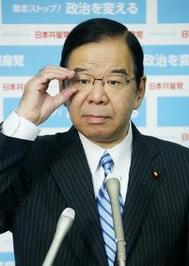 Source: www.jiji.com
Source: www.jiji.com Polling for the JCP has placed them at 4.9%, 5.8%, 5%, on par or slightly above the Komeito but significantly behind the two leading parties. Not for a moment am I suggesting that the JCP has any chance of pulling off an electoral miracle and bring down the incumbent LDP, but for the 40% or so undecided voters within the Japanese electoral system, any protest vote that they might want to make against either the LDP or its offshoots (which includes the Party of Hope, whose own policies either mirror or exceed in severity those of the LDP) will probably go to the JCP.
The JCP has been doing its utmost to tap into this dissatisfaction. Its party platform going into the election is basically a mix of “stop the reckless Abe government” and using citizen and opposition co-operation to bring about change (by imitating the Tokyo metropolitan election result at a national level). This is in addition to vowing to halt the LDP/Komeito attempts at constitutional revision and repeal its security laws, prevent the acquisition of nuclear weapons, stop any attempt to restart Japan’s nuclear power plants, eliminate discrimination against women and uphold human rights, protect citizens from natural disasters, and bring up the issues of Abe’s involvement in the Moritomo and Kake Gakuen scandals to prevent any attempted privatization of public assests.
Whether or not any of this will resonate with the population as a whole is debatable, particularly when the threat of North Korea looms large (indeed, the timing of the election has raised questions and the ire of commentators who believe it is little more than an attempt by PM Abe to exploit divisions among opposition parties and the threat of North Korea, thereby securing a third term for Abe and cementing a legacy for himself as Japan’s longest serving PM).
Yet with its anti-militaristic, anti-US, anti-capitalism advocacy, its trumpeting of social values and the strength of the community and its fierce defence of constitutionalism, the JCP represents a very real alternative voters may be seeking if they wish to unsettle the ruling parties. Voting for the JCP would require a leap of faith in voters to challenge the political arguments put forward by the LDP/Komeito over the past 5 years, a task made more difficult by the regulated nature of political coverage in Japan which limits the expression of alternative views to those of the government in public (not to mention the inherent conservatism of Japanese voting patterns). But the arguments of JCP politicians, particularly those of Party leader Shii Kazuo, who has been fighting against both LDP/Komeito and DPJ governments as leader since 2000, might just lead the party to gain an extra seat in the Lower House, draining some votes away from both the LDP and the Party of Hope and making the JCP the true alternative to the political mainstream.
Whether or not the Japanese population is prepared to embrace its own form of populism is unknown, but if enough of the voting public are concerned about the direction of Japanese society and are determined to bring about a radical transformation in its current path, a vote for the JCP would be one powerful way to achieve this.
 RSS Feed
RSS Feed